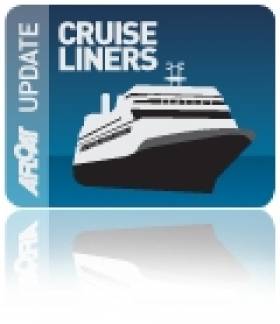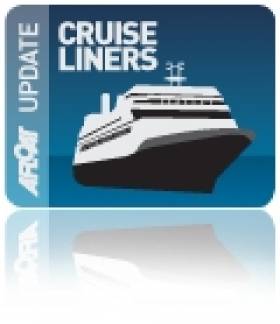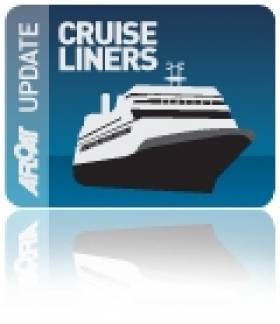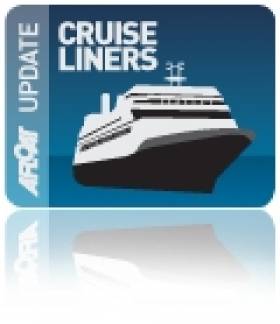Displaying items by tag: Club Med 2
Club Med's Five-Mast Cruiseship Calls to Cobh
#ClubCorkCruise – Club Med 2 called to Cobh today where passengers from the impressive five-masted cruiseship visited the town's charming hillside location overlooking Cork Harbour and regional attractions, writes Jehan Ashmore.
The 14,000 tonnes ship completed in 1992 had sailed from the Isle of Scilly is operated by Club Med which was founded by Gérard Blitz who was a pioneer of the all-inclusive holiday company in 1950.
At 187m long the vessel with computer-controlled masts has a sail-surface area totalling 2,000sq, a ship of her appearance demonstrates a distinctive alternative and appeal to conventional cruiseships.
Tucked in between the second and third masts is the ship's slender funnel. At the top, uptakes are split in two and angled to deflect the fumes away from the masts above the eight-deck vessel.
Asides the usual passenger facilities, are sporting pursuits ranging from sailing, snorkelling, water-ski and windsurfing which are provided from the 'nautical hall' of the vessel located at the stern.
Accommodation are in cabins designed by Sophie Jacqmin, all with sea views for her 372 passengers who are looked after by 200 crew members.
The following cabin categories on board the French flagged vessel are designated as follows, Club Cabins, Deluxe Cabins or Suites, including Shipowners Suites which are located towards the bow of the vessel.
This teatime, the Club Med 2 is scheduled to depart, so what cruise-caller is next to call alongside the dedicated cruise berth. To find out check, the Port of Cork's website, by clicking HERE.
No Sails as Cruise Liner 'Club Med 2' Departs Dublin Bay
#cruiseliner – As majestic as she might be, the five–masted cruise liner, Club Med 2 left Dublin Port yesterday evening, and just like local craft she dwarfed, she was unable to sail away, as there was no wind on Dublin Bay.
Instead, the 637–foot long the Club Med 2, normally associated with the splendours of the Mediterranean Sea during the summer months, slipped away past the Baily lighthouse under engine.
As previously reported in our cruiseliner section of Afloat.ie, a crew of 200 cater for the floating resorts 439 passengers who can indulge in a stress-free atmosphere thanks to two swimming pools and fitness rooms. Passengers can also enjoy sporting pursuits ranging from sailing, snorkelling, water-ski and windsurfing which are provided from the 'nautical hall' of the vessel. Guests are accommodated in 175 cabins and 11 suites.
A one-person, seven-night cruise aboard the Club Med 2 costs $1,894 for an all-inclusive 'vacation experience' (in Australia), according to the Huffington Post.
#ClubMedCruise – As previously reported on Afloat.ie, Club Med's impressive five-masted cruiseship Club Med 2 (1992/14,983grt) docked into Cork Harbour this morning, writes Jehan Ashmore.
She had sailed overnight from Brest and her presence alongside Cobh will make for a refreshing sight compared to the usual albeit considerably larger cruiseships that compete with the town's steep sided ramparts.
The 637 foot long the Club Med 2 which is normally associated with the splendours of the Mediterranean Sea during the summer months also cruises in Caribbean waters during the winter.
A crew of 200 cater for the floating resorts 439 passengers who can indulge in a stress-free atmosphere thanks to two swimming pools and fitness rooms. Passengers can also enjoy sporting pursuits ranging from sailing, snorkelling, water-ski and windsurfing which are provided from the nautical hall of the vessel. Guests are accommodated in 175 cabins and 11 suites.
Tomorrow the Port of Cork is set to welcome 1,500 Australians and 400 Kiwis to the town as part of their Sydney to Sydney 104-night World Cruise on board the Sea Princess. In addition Cobh will be hosting Australia Day and hopefully with the weather to match!...while watching the Rugby action 'Down-Under'.
#CruiseTallShips – An unprecedented number of cruiseships also equipped with sailing masts are to visit Irish ports this season, starting with the arrival of the five-masted Club Med 2 to Cork Harbour tomorrow, writes Jehan Ashmore.
Club Med's impressive 637-foot vessel is to dock alongside Cobh Cruise Terminal around dawn tomorrow and a further two such cruiseships the Sea Cloud II and Wind Surf are to visit Irish ports before mid-July.
Those privileged to experience a cruise on these types of cruiseships have the added opportunity in operating the rigging systems, albeit they are mechanically controlled.
Sea Cloud II which has three masts has a total sail area of approximately 32,150 sq. feet (3.000 m²) and carries a mere 64-passengers. She is operated by Sea Cloud Cruises and the 384-foot vessel is also to head for Cork Harbour, however on this occasion during her call on 13 July, she is expected to take anchorage off the Whitegate Oil Refinery.
The final member of the trio is another five-masted vessel, Windstar Cruises 310-passenger Wind Surf. The 535-foot long vessel is heading too for the south coast on 16 July when she also makes an anchorage call off Dunmore East.
Further calls by the trio are to include visits to Belfast Harbour, Dublin Port and Dun Laoghaire Harbour.

































































